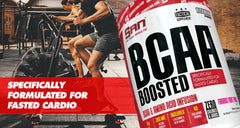If you've spent any time at all looking into sports nutrition, you've no doubt seen ads and recommendations for getting the most protein you can, usually in the form of supplemental protein powder. For those on a budget, or for those who've simply never used supplements of any kind, it might be difficult to understand why you'd use protein powder at all instead of just eating more. That's because it can be inconvenient and time consuming to actually ingest that much food. And that's when the power of protein powder comes into play...
No, if you have a well-balanced diet, you probably don't need more protein — emphasis on ""need."" But if you want better performance or an athletic physique, that's a whole other story.  With proper nutrition, you can achieve some amazing results by spreading your meals out over five or six smaller feedings per day, but that doesn't mean it's the most effective or efficient method.
In fact, if you're following any online diet recommendations that have a protein powder or meal replacement listed, you could simply replace those recommendations with a whole-food meal that has similar macronutrients. For lean muscle-building, a good rule of thumb is to get at least 20 to 30 grams of protein per meal, a similar number of carbs,” or even a bit less, and to aim for around 300 calories total per meal from a balance of all macronutrients (that number varies greatly depending on your goals and metabolism).
So what's the real power of protein powder if you can get your nutrition from food? Well, protein powders are mainly used for convenience, assimilation, and protein quality. Most people simply don't have enough time to prepare or heat up food that many times per day, let alone the appetite it would require. It's much easier to have your protein powder in a shaker bottle, add some water, shake it up, and drink when you need a protein boost. And you can even do that for added protein with meals, not just between them.
And for those who are worried about budget and the added expense, that's another power of protein powder. Money is one of the bigger reasons to use them. To achieve 30 to 40 grams of protein with balanced vitamins, minerals, and immune system boosters will typically average a couple of dollars per serving. The time, effort, and ingredients of a whole-food meal can quickly add up to much more than that.
For the sake of convenience and quality, premium whey, casein, and plant-based protein supplements should be included in your grocery budget rather than being a separate ""supplement budget"" because they're still considered food. Using a quality protein powder can reduce the amount of solid food you eat, and that could significantly reduce your grocery bill in many cases.
Even if you only want to test the power of protein powder, simply adding a post-workout protein drink can make your goals much easier to achieve. Whether it's weight training, HIIT cardio, or just about any other type of exercise, after a workout is the most crucial time to get the highest quality nutrients, so that's when the power of protein powder pays off the most.
Plus, the flavor of protein powders has come a long way over the years, allowing you to take advantage of satisfying your cravings while boosting your protein intake. So pick your protein source and your favorite flavor and experience the power of protein powder first hand!













